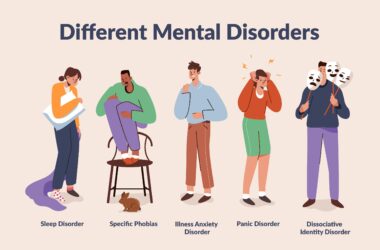Considering the current state of the world, it’s no wonder that Generation Z is depressed. Gen Z is constantly living through one historic event after another, with no hopes for a positive future or certainty of even surviving in the long-term; and faces a myriad of stressors on the daily, contributing to increased rates of depression and mental health issues. Factors include academic pressure, social media influence, economic uncertainty, failing job market, record high inflation, housing market crisis, climate change, and the pervasiveness of technology leading to constant comparison and FOMO (fear of missing out). Moreover, the current global landscape with events like the COVID-19 pandemic, elevated poverty, and increased warfare in multiple countries have further aggravated feelings of isolation and uncertainty among this generation.
Read More: Poverty and Teenage Pregnancy
Generation Z And Suicide
Followed by the increase in Generation Z mental health issues, such as anxiety and depression, Gen Z has experienced a concerning rise in suicide rates. Between 2007 and 2017, the suicide rate among Gen Z increased by 56% and the current statistics of overall suicide stands at an astronomical 703 000 suicides per year (according to WHO). To put this into perspective, it’s one suicide every 40 seconds! Various factors, as discussed above, contribute to this trend and addressing this issue requires comprehensive mental health support, destigmatization of mental illness, promoting healthy coping mechanisms, and creating supportive environments for young people to seek help when needed.
Mental Health And Mental Health Care For Generation Z People Of Color
Mental health and mental healthcare for Generation Z people of colour are deeply influenced by a complex interplay of socio-cultural, economic, and systemic factors that work against the people of colour. Racial discrimination, intergenerational trauma, acculturation stress, and disparities in access to mental healthcare services contribute to heightened mental health challenges within these communities. Systematic racism and structural barriers, such as lack of culturally competent care and financial constraints, worsen these challenges even further. To address these issues effectively, it is crucial to prioritise culturally responsive and inclusive mental healthcare that acknowledges the diverse backgrounds and experiences of Generation Z people of colour. This includes increasing access to culturally competent mental health providers, promoting community-based support systems, destigmatizing mental illness within communities, and advocating for policies that address systemic inequities in healthcare access and delivery. Additionally, providing resources for coping skills, resilience-building, and identity affirmation can empower young people of colour to navigate and thrive amidst mental health challenges.
Read More: Meditation and Types of Meditation
Factors Contributing to the Rise in Mental Health Issues in Gen Z
Chronic Stress
Generation Z faces unprecedented levels of chronic stress due to various factors like academic pressure, financial instability, and societal expectations. The constant demands of school, work, and social life can overwhelm young people, leading to anxiety, depression, and other mental health issues. Without adequate support systems in place, managing these stressors becomes increasingly challenging, contributing to the rise in Generation Z mental health problems.
Social Media and Technology
The pervasive influence of social media and technology has significantly impacted the Generation Z mental health. Constant exposure to curated images, unrealistic beauty and living standards, and cyberbullying on social media platforms can erode self-esteem, foster feelings of inadequacy, and trigger mental health conditions like depression and anxiety. Moreover, excessive screen time and digital overload can disrupt sleep patterns, social interactions, physical health and overall well-being, further contributing to mental health challenges among young people.
A World in Flux
Generation Z is navigating a rapidly changing world characterised by technological advancements, economic uncertainty, and socio-political upheaval. This constant state of flux can create feelings of uncertainty, disillusionment, and existential angst among young people, impacting their mental health and overall sense of stability. Additionally, ongoing global issues such as climate change, social injustice, multiple concurrent wars, and global pandemics add additional layers of stress and anxiety, worsening the Generation Z mental health crisis. Addressing these systemic challenges requires comprehensive strategies that prioritise mental health education, support, and advocacy tailored to the needs of Generation Z.
Read More: Types of Relationships
How to Reduce Generation Z’s Mental Health Issues
Increased Awareness
Educating Generation Z about mental health, its importance, and the prevalence of mental health issues can help normalise conversations surrounding mental well-being. Providing information through school programs, community initiatives, and digital platforms can empower young people to recognize signs of mental distress, seek help when needed, and prioritise self-care practices. Increased awareness would also lead to timely interventions and healthier coping mechanisms.
Destigmatizing Therapy
Combating the stigma surrounding therapy and mental health treatment is crucial in encouraging Generation Z to seek professional help. Changing the taboo culture and normalising therapy as a valuable tool for mental wellness through open discussions, media representation, and storytelling can challenge negative perceptions and encourage individuals to access therapy without fear of judgement or shame. Destigmatisation of therapy will also help reduce the social bullying and systematic discrimination of people facing mental health issues.
Building Support Systems
Creating supportive environments within families, schools, workplaces, and communities is essential for addressing Generation Z’s mental health needs. Implementing peer support programs, mentorship initiatives, and mental health resources in educational and professional settings can foster a sense of belonging, connection, and resilience among young people. Additionally, promoting inclusive and empathetic communication channels where individuals feel heard, valued, and supported can further strengthen the support systems available to Generation Z.
Read More: Social Media Impacts Gen Z’s Mental Health
Conclusion
Generation Z mental health challenges are multifaceted and complex, stemming from a combination of societal, cultural, and systemic factors. Chronic stress, exacerbated by academic pressures and economic instability, along with the pervasive influence of social media and technology, contribute to increased rates of anxiety and depression among young people. Moreover, the uncertainty and upheaval of the modern world, compounded by global issues like climate change and social injustice, further worsens Generation Z’s mental health crisis. To address these challenges, it is imperative to increase awareness of mental health issues, destigmatize therapy, and build robust support systems tailored to the needs of young people. By prioritising mental health education, advocating for access to culturally competent care, and fostering inclusive and supportive environments, we can work towards reducing the prevalence of mental health issues among Generation Z and promoting overall well-being for future generations.
FAQs
Yes, many members of Generation Z report feelings of hopelessness, especially in light of the numerous challenges they face, such as economic uncertainty, climate change, and social injustice. These factors contribute to a sense of pessimism about the future among some individuals in this generation.
Generation Z often struggles with a range of difficult emotions, including anxiety, depression, loneliness, and stress. These emotions can stem from various sources, such as academic pressure, social media influence, economic instability, and concerns about the future.
Although generation Z is stressed about a multitude of issues, including academic pressure, societal expectations, global and social issues, etc. financial worries and uncertainty has been reported to top the list.
Generation Z is often described as the “hardest” generation because they face unprecedented challenges and pressures, including economic uncertainty, academic pressure, social media influence, and global issues like climate change and social injustice. These factors contribute to high rates of anxiety, depression, and stress among members of Generation Z.






